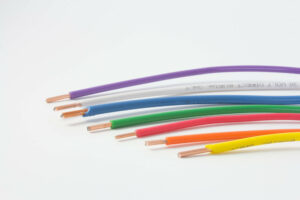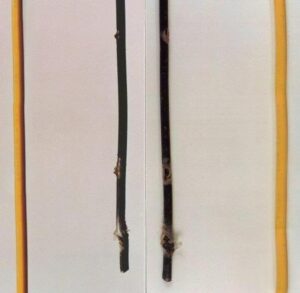*Tracer wire is a big part of what we do here at Performance Wire and Cable. The purpose of this post is not to say electric wire tracer is better than THHN wire or vice-versa. It intends to point out differences between the two and help explain why the two options are suitable for different applications.

THE DIFFERENCE BETWEEN TRACER WIRE AND THHN WIRE
Tracer Wire: Tracer wire can also be used for general purposes such as wiring circuits, machine tools, and appliances and is a great replacement for the traditionally used THHN wire because it is safer and lasts longer. Tracer wire’s primary use is to locate buried water/gas pipes and fiber optic cables. It is also called underground locator wire, locating wire, and electric wire tracer.
THHN Wire: Thermoplastic High Heat-resistant Nylon (THHN) is a general-purpose wire used in machine tooling and some appliances, however, its main use is as building wire. THHN wires are used as electrical wires to transmit electricity throughout buildings. THHN wire is not approved for burial underground.
Composition
THHN stands for thermoplastic high heat-resistant nylon. The wire itself is copper or aluminum (both electricity conductors), either stranded or solid. The wire is then coated by polyvinyl chloride (PVC), followed by a coating of nylon.
Underground tracer wire can be referred to as either TH wire or THW wire. Like THHN wire, the TH stands for Thermoplastic Heat resistant. The added “W” in THW signifies that the wire is also resistant to water. Tracer wire’s outer coating is polyethylene which makes it resistant to water.
Tracer wire’s polyethylene coating is thicker, lasts longer, and is more resistant to the elements than the nylon coating of THHN wire. As a result, tracer wire is the best choice for durability and will likely withstand the lifespan of the job it is being used for. THHN wire which frequently needs to be replaced as it has corroded or no longer transmits electricity.
Features/Benefits
THHN wire is approved for up to 600 volts, which satisfies most residential and industrial electrical needs. It rates up to 90 degrees Celsius in dry settings. Unless it is THWN rated, THHN wire does not perform well in wet environments. The nylon outer layer gives the wire flexibility, which is crucial for wiring and cabling needs.
Tracer wire is also is approved for up to 600 volts and performs well up to 90 degrees Celsius. It ranges from 8-14 AWG.
Tracer wire can withstand up to 75 degrees Celsius in wet conditions thanks to its polyethylene coating. This outer layer also provides resistance to corrosion, water damage, and exposure to gas and oil. That’s why it is ideal to use for locating gas and water pipes.
Tracer wire can withstand higher temperatures in wet conditions, lasts longer, and is less dangerous than THHN wire.
For a more comprehensive description of tracer wire benefits, click here.
Cost
THHN is less expensive than tracer wire; which contributes to its popularity as building wire. In some residential, industrial, or construction scenarios that require a lot of building wire, THHN wire is the logical choice because it can create substantial savings.
However, problems arise when contractors choose THHN for applications that would be better suited for tracer wire. Contractors may see initial cost savings, however constant repair, maintenance, and replacement costs can quickly turn those immediate savings into a monumental loss over a long-term period.
In the photo below, the black THHN wire and yellow tracer wire were compared after the same time frame of use. Notice the THHN wire eroded and became a hazard, compared to the yellow wire which had an optimum performance.

Electrical wiring has the potential to be dangerous when lower quality wire that is not properly suited for the job is selected. THHN wire is quickly becoming obsolete, as tracer wire is now a safer, more readily available option for general-purpose wiring needs. Visit our tracer wire page for more information.
